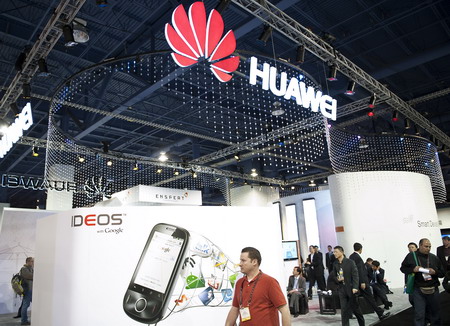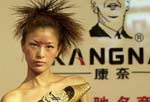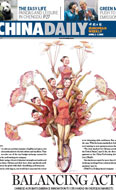Economy
Economist hits out at trade protectionism
Updated: 2011-04-07 12:31
By Ariel Tung (China Daily)
|
 |
|
Huawei Technologies Co Ltd, one of the world's largest manufacturers of telecommunications equipment, has encountered some "political difficulties" in penetrating the US market. [Photo / Bloomberg] |
NEW YORK - A top Chinese economist has condemned trade protectionism, saying that a free flow of trade between China and the United States will benefit both economies.
Professor Zhang Weiying, of Peking University, said he thinks trade protectionism is bad, "whether in China or America".
Zhang, who is in New York for the China-US Business Leaders Roundtable from April 5 to 8, also said that the US government and people do not trust State-owned Chinese companies.
"That's why Chinese private companies generally face less restrictions as compared with State-owned companies in their expansion in the US," Zhang said.
More Chinese companies are now seeking investments in the US as they go global to become bigger players in domestic markets through mergers and acquisitions or joint ventures with overseas partners, he said.
Zhang, who will deliver an opening speech at the New York Stock Exchange on April 7, was heavily involved in China's economic reform policy and was the first Chinese economist who proposed the "dual-track price system reform" in 1984.
"China's domestic market is very big. Chinese consumers will become more and more demanding," he said.
"Many Chinese entrepreneurs have realized that, in order to increase the company's competitiveness in their home market, they have to go global and compete with foreign companies. I think it is a good practice."
From 2002 to 2009, China's overseas investments grew by 54 percent a year, a Chinese Ministry of Commerce report said. Most of the investments came from private companies in China.
Zhang thinks that Chinese private companies need to seek overseas market due to the lack of resources in China.
"The private companies are very ambitious but unlike the State-owned companies in China, they have little access to the limited amount of resources," he said. "That's why they go to Africa, the Middle East and other parts of Asia where resources are aplenty."
Another reason for going overseas is to develop a global brand, which will help strengthen the company's market share in China.
Huawei Technologies Co Ltd, one of the world's largest manufacturers of telecommunications equipment, has encountered some "political difficulties" in penetrating the US market.
To Zhang, this is unfortunate because "when the US imposed some restrictions, it's not in the interest of its economy, but in the interest of some special groups of people".
"In Huawei's case, the company is totally privately run and has received little support from the government. But they made up an excuse to stop Huawei. I think it is not fair," said Zhang.
"Huawei's case is certainly a reminder to other Chinese companies that even when you invest in the US, a so-called free market economy, you will need to overcome lots of legal restrictions and cultural barriers. But I don't think all companies will be discouraged by Huawei's unsuccessful attempts."
China's Chamber of International Commerce said that about 70 to 80 percent of its 300 members have overseas investments, with 20 to 30 percent of them in the US.
Zhang agreed that the US is one of the best places for Chinese companies to go global. "America is a good market for Chinese companies that want to be global players. Its transparent business environment is attractive to investors," he said.
"But the future is hard to predict. If the US government imposes more and more restrictions and regulations, that will only discourage investments from Chinese companies."
E-paper

Green mission
Tony blair believes China will take a leading role to fight climate change and cut emissions.
The spring of new professions
Real modern times
F1 sponsors expect returns from Shanghai stop
Specials

Share your China stories!
Foreign readers are invited to share your China stories.

Have you any wool?
The new stars of Chinese animation are edging out old childhood icons like Mickey Mouse and Hello Kitty.

Fill dad's shoes
Daughter and son are beginning to take over the family business of making shoes.




